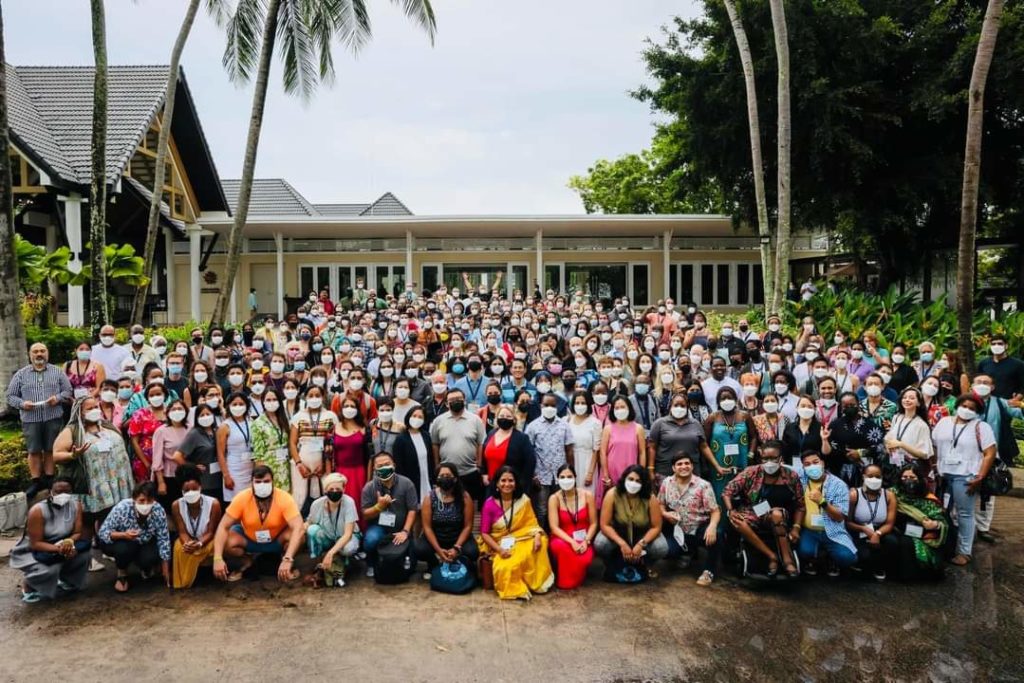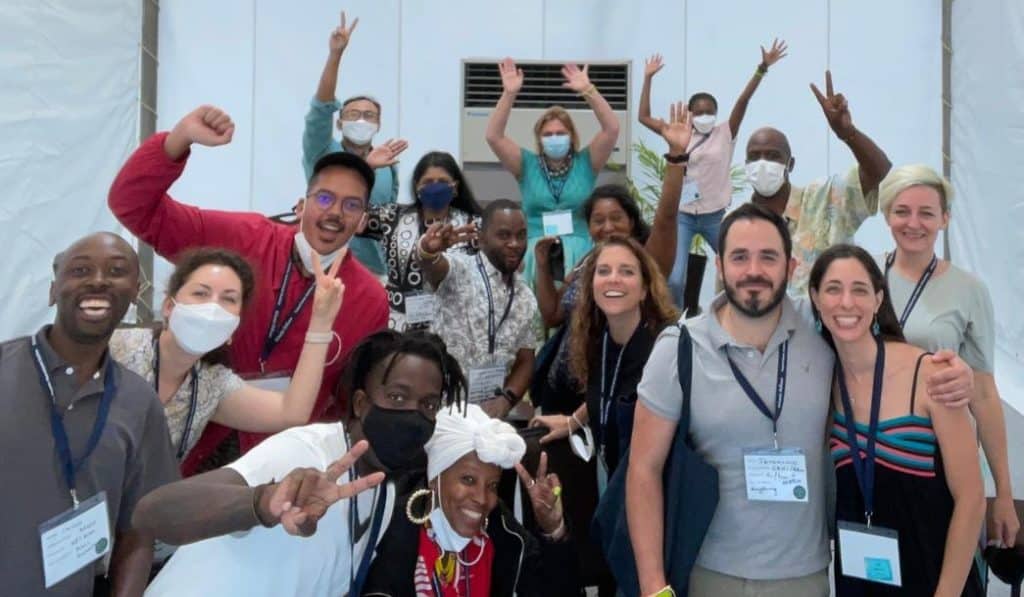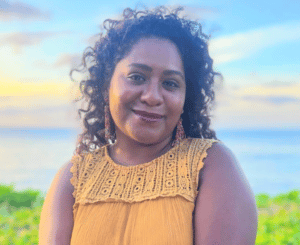As we near the end of 2022, we asked our board member Joan Jones to reflect on the work of the Budget & Policy Center in this guest blog post. In it, they shared their perspective on the links between local and global movements for economic justice. Joan brings a wealth of knowledge from their professional experience and also shares their personal story.
I joined the board of the Washington State Budget & Policy Center in 2020. As an incoming Executive Director of SEIU Washington, I understood my entry into the organization as a rite of passage all previous SEIU directors had experienced with roots leading all the way to the founding of the Budget & Policy Center in 2006. Yet, situated in the context of the pandemic and coming back from my time spent at the London School of Economics (LSE), this appointment felt unique. It was an opportunity to take all of what I learned about global inequity and tie that into the anti-racist work I have done as a labor leader to move toward local community impact.
The time I spent as a practitioner at LSE was part of a one-year Atlantic Fellows for Social and Economic Equity global leadership program. I had chosen this fellowship to orient myself, as a Black and Mexican American labor leader within the context of the rest of the world; to expand my thinking about how my work in labor interacted with global systems of inequity. The program’s website boldly promised we would unravel the root of global structural inequity and that “Inequality is not inevitable.” I was enthralled.
Colonization at the root of global inequities
I will cut to the chase of what was learned when I studied at the London School of Economics: It was through colonization and the creation of our still-standing global financial systems and subsequent tax policies that emerged a global capitalist system purposefully designed to create winners and losers. To my dismay, disdain, and complete lack of astonishment, the root of inequity boils down to a finely tuned system and a spreadsheet.
What is more, as we all know, the winners look like the people who built the system and the losers look like me, those who were hit hardest by colonial powers. For the first time, I saw my family’s migration story in a different light. From my ancestors who experienced forced migration to the United States by way of slave ships in the night, to my grandparents who left their pueblito in Guerrero, Mexico to find a better life in the United States. Every immigrant story, I realized, has roots in our global capitalist system.
Growing local solidarity for economic justice
So, I joined the board within that context. Armed with my newfound global systems thinking knowledge to act locally in the community I was born and raised in: Washington state. I could not be prouder of the work the Washington State Budget & Policy Center has done since I have been a part of the board. The pandemic marked a turning point for many in Washington who told us through polls and community conversations that enough is enough.
With the pandemic creating new billionaires every 30 hours, Washingtonians are coming together now more than ever to say we are done being the worst state in the nation when it comes to our upside-down tax code. Through work at the Budget & Policy Center, and the Working Families Tax Credit Coalition, we finally funded the Working Families Tax Credit in 2021. Now working families and individuals will see tangible support they have needed for years. Also, we have passed a measure to tax our state’s top .2% of income earners through a capital gains tax, which will generate millions of dollars for education across the state.
Economic justice is racial justice
Yet, our work is not done. The board of the Budget & Policy Center understands that. We know that despite the continual attempts from the opposition to thwart progress that can positively affect working class people, we have one thing they do not. Our side has power in numbers. We are active in coalitions that connect us to people in communities across the state who believe that it’s time for the wealthiest Washingtonians to pay what they owe in taxes. We know the people who we need to shift this rigged fiscal system are the very people who will benefit from a change in its design. That includes all working-class people regardless of their skin color.
As a lifelong organizer, activist, and advocate, I see the Budget & Policy Center’s commitment to anti-racism as essential in order to do this work well in the community. It is work that requires us all to examine and re-examine the biases and misconceptions we hold within us on a daily basis. Even as a known organizational development and equity leader, I still find time to ask myself: What are the misconceptions I have held about communities that are not my own? How might I challenge them?

Links between local and global movements for economic justice
As I sat down with people, many from the global south, it was clear that not just the state of Washington was grappling with unjust and unfair revenue solutions. Money being consolidated at the very top and not trickling to communities that need it is a global issue with roots going back to colonization. Yet oftentimes, in the United States we don’t make the connection that the play book being run by the far right was first finely tuned in the global south before wreaking havoc on the lives of everyday Americans.

I once more circled back to the questions I continually ask myself. What are the misconceptions I have about communities that are not my own? How might I challenge them? As I heard my African comrades speak to the severe inequity they faced, I became grounded in the fact that the world’s fiscal system as we know it was created in a time when the world’s elite believed people from the global south were subhuman. This assumption formed the societal basis for the systematic extraction of resources in global south communities.
And subsequently when people from the global south moved to the global north, this assumption was once again the societal basis by which they were structurally over-policed, governed, and discarded within western culture. Black Lives Matter, children in cages on borders, and my Asian American peers being attacked on the streets in the wake of COVID-19 doesn’t happen without that history that has shaped society around us.
Economic justice is for everyone
No matter if we are white, or Black, immigrant or American born, all people should have the right to a living wage, healthcare, and the ability to meet their basic needs. Yet, documented and undocumented immigrants have dealt with more systemic racism and economic disaster than the average American but somehow it is still considered controversial for them to benefit from American tax dollars. Despite the fact that immigrants are just as likely to contribute to the wealth of billionaires in the United States and contribute to our tax system without getting access to the same benefits other Americans receive. Even still, in Washington state we see people from Africa, Latin America, and Asia every day working in our communities just as hard as people born and raised here. Often harder.
Colonization and migration
In 2013, as an organizer with SEIU 925, I found myself living in the eastern part of Washington state. There I organized early learning teachers in Latin American migrant communities. In 2014, I moved to Seattle and continued to work with early learning educators, this time in the Somali community learning about the civil war and economic collapse of their country. In both of these cases, Mexico and Somalia, colonial powers came, set up governments, and left without creating the proper infrastructure that would allow for all of their residents to have the kind of safety net many countries in the global north have afforded to themselves.
This is directly responsible for their migration to Washington. Put in this light, it is easy to see how this framing is distinct and separate from the story we are often told about why western culture thrives and communities in the global south don’t. It disrupts the false and harmful narrative that hard working Americans are having their jobs taken away by immigrants when we can discuss how the world’s global financial systems have failed us all. With these facts we can confront the myth that it is by virtue alone that we Americans are better and more fit than those other countries.
We must invest in economic justice
And now, the same suggestions that once devastated communities in the global south are being considered at home. Take away public goods, privatize healthcare, lower barriers to keep corporations thriving, tax workers not the wealthy. These policies did not start here but now, because we did nothing to intervene with our brothers, sisters and gender non-conforming siblings around the world, they are coming back to haunt the very people they were claiming to support in the first place.
Wealth is being consolidated within the hands of the 1% while everyday Americans increasingly feel just as slighted as people in the global south who must work hard every day, some without the possibility of healthcare, retirement, or any glimmer of a must needed safety net. These policy choices lead right back to tax policy in a way that connects us to the broader global community, to the ways in which people in power have used race and nation to divide working people against each other for centuries.
Calls for solidarity, locally and globally
As an organizer, I have a curiosity about where the progressive revenue fight can go if we remain rooted in the fact that we, as working-class people, are connected regardless of our skin color, religion, and geographical location. So, in true organizer style, I have written three calls to action that help us both remain grounded in our particular local fights while still keeping an eye out for our comrades in the global tax justice movement.
First, we can empower immigrant communities to lead in the realm of progressive revenue. A simple way to start is to have them share their stories about the interconnectedness of their story and global fiscal policy. It’s easy for tax policy to seem out of reach for the average person. Therefore, connecting the ways colonization and western influence has affected their family history through workshops, timeline activities, and discussions can help illuminate how local issues on the ground connect to their life in a tangible way.
Second, we can double down on our commitment to stamp out racial inequity and structural racism when we see it. The intersection between structural racism and tax policy dates back to the very beginnings of our global financial systems. Attacking this root will lead to a better system for everyone. Not just for Black, Indigenous, and People of Color, but it will result in better blanket policy for all working-class people in this country.
Lastly, we must remain vigilant of opportunities to learn from the tax revenue playbook that the super rich have refined in other parts of the world. When we understand how the tactics currently used against us were created and refined, we can be better prepared for what they will throw at us in the future. Acknowledging how world events affect and shape our current moment will help us build a better movement for us locally and create railways that can support a global movement for tax justice.
Aboriginal Rights activists in Queensland, Australia have said, “If you have come here to help me, you are wasting your time, but if you have come because your liberation is bound up with mine, then let us work together.” Here in the state of Washington our work on building a better Washington has led us to a place where white, Black, immigrant, queer, every type of person in America you can think of is ready to do the work necessary to change our upside-down tax code and win for every-day working class people in Washington. So let us work together and build at home, grounded in a global vision that every person has enough to live a full vibrant life with dignity and justice for all.
